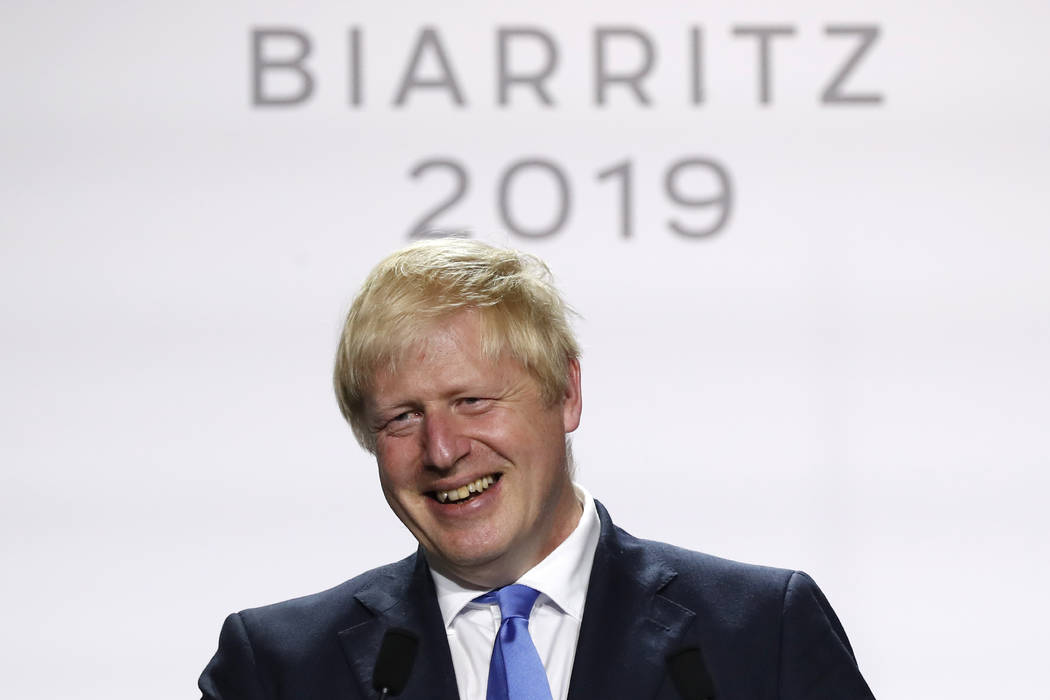Trump supports British PM in suspension of Parliament
LONDON — U.S. President Donald Trump says it will be hard for the leader of Britain’s main opposition party to seek a no-confidence vote on Prime Minister Boris Johnson over Brexit.
Labour Party leader Jeremy Corbyn and other opponents of Johnson’s Conservative Party government were scrambling Wednesday after the prime minister moved to suspend Parliament for about a month.
Queen Elizabeth II granted Johnson’s request to do just that, shortening the time the opposition has to keep him from taking the U.K. out of the European Union on Oct. 31 even if it doesn’t have a withdrawal agreement with the EU.
Johnson is a strong Brexit supporter.
Trump tweeted Wednesday “it would be very hard” for Corbyn to get a no-confidence vote “especially in light of the fact that Boris is exactly what the U.K. has been looking for, & will prove to be ‘a great one!’ Love U.K.”
The two leaders met in recent days at the Group of Seven summit in France.
Queen’s OK expected
The queen’s move was not unexpected, as the monarch has steadfastly refused to get involved in politics throughout her long reign.
Opposition lawmakers contend that he wants to limit the ability of lawmakers to come up with legislation to block a no-deal Brexit.
The queen is the head of state and is politically neutral. She acts on the advice of her government in political matters.
The German government isn’t commenting on Johnson’s move to suspend Parliament, depriving opponents of time to thwart a no-deal Brexit.
Chancellor Angela Merkel’s spokesman, Steffen Seibert, told reporters in Berlin Wednesday that “this is a parliamentary procedure in Britain that is being discussed vigorously there, and won’t be commented on by the government spokesman in Germany.”
Johnson met Merkel in Berlin last week, and also has traveled to Paris and to the Group of Seven summit in Biarritz as he tries to extract concessions from the European Union on the terms of Britain’s withdrawal agreement — concessions that the EU appears unlikely to offer. He has insisted that Britain will leave the bloc on Oct. 31, with or without a deal.
Pound plunges
The pound plunged on the news, down to $1.2196 from almost $1.2300 the previous day.
A day earlier, opposition lawmakers declared that they would work together to try to stop a departure from the European Union without an agreement, setting up a legislative challenge to Johnson and his promise to complete the divorce by Oct. 31, come what may.
Some 160 lawmakers have signed a declaration pledging “to do whatever is necessary” to prevent Johnson from bypassing Parliament in his plans. Johnson’s do-or-die promise has raised worries about a disorderly divorce that would see new tariffs on trade and border checks between Britain and the EU, seriously disrupting business.
Johnson has told European Union officials it won’t be possible to agree a deal on Britain’s departure from the trading bloc without the removal of controversial language on a “backstop,” aimed at avoiding the return of a border between EU member Ireland and Britain’s Northern Ireland. He said at the close of the G-7 summit in Biarritz, France, Monday that he was “marginally more optimistic,” of progress.

















